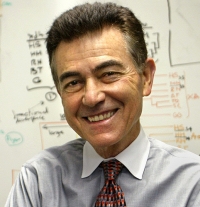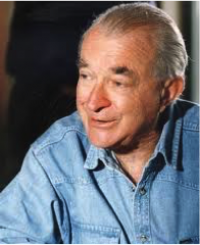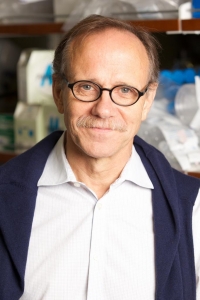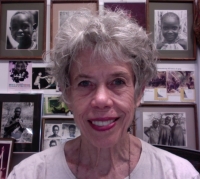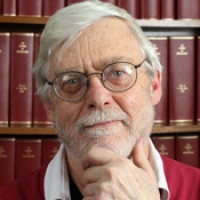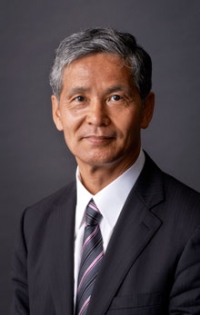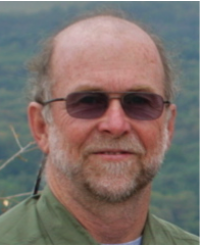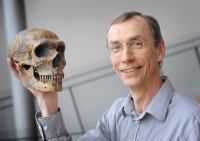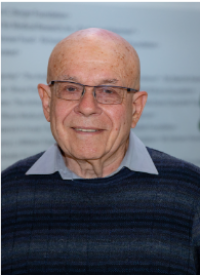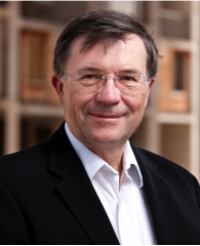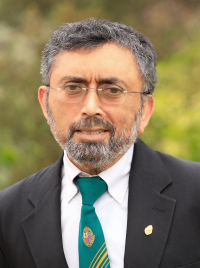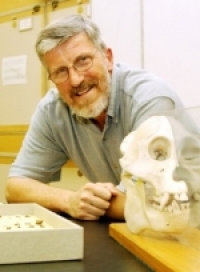Anthropogeny: Defining the Agenda
Biographical Sketches: Speakers
University of California, Irvine
Francisco J. Ayala is “University Professor” and Donald Bren Professor of Biological Sciences at the University of California, Irvine. On 12 June 2002, President George W. Bush awarded him the National Medal of Science at the White House. From 1994 to 2001, Ayala was a member of President Clinton's Committee of Advisors on Science and Technology. He has been President and Chairman of the Board of the American Association for the Advancement of Science (1993-1996), and President of Sigma Xi, The Scientific Research Society of the U.S (2004-2005). Dr. Ayala is a member of the U.S. National Academy of Sciences, the American Academy of Arts and Sciences, the American Philosophical Society and numerous foreign academies, and has received numerous prizes and 24 honorary degrees from universities in 10 different countries. He has published more than 1200 articles and is author or editor of 60 books. Dr. Ayala has made significant and wide-ranging experimental and theoretical contributions to evolution theory. His scientific research focuses on population and evolutionary genetics, including the origin of species, genetic diversity of populations, the origin of malaria, the population structure of parasitic protozoa, and the molecular clock of evolution. He also writes about the interface between religion and science, and on philosophical issues concerning epistemology, ethics, education, and the philosophy of biology. He was a chief witness in the creationist trials in Arkansas in 1981 that prevented religion from being taught as science in the classroom. Dr. Ayala has been called the “Renaissance Man of Evolutionary Biology” by The New York Times. In May, 2010, Professor Ayala received the Templeton Prize from H.R.H. Prince Philip, the Duke of Edinburgh, in Buckingham Palace.
University of Melbourne, Australia
Derek Denton is founding director and originating board member of the Howard Florey Institute of Experimental Physiology and Medicine, an autonomous Institute in the University of Melbourne; adjunct scientist at the Southwest Foundation for Biomedical Research in San Antonio, Texas; elected foreign associate of the Académie des Sciences, Institut de France; elected fellow of the Royal Society, London; foreign associate of the National Academy of Sciences of the U.S.; honorary fellow of the Royal College of Physicians London; honorary member of the American Physiological Society; honorary foreign member of the American Academy of Arts and Sciences; fellow of the Australian Academy of Sciences; foreign medical member of the Royal Swedish Academy of Sciences. Formerly, Denton was the first vice president of the International Union of Physiological Sciences; chairman of Nominating Committee; chairman of the Committee on Aims and Functions of the 28 Commissions of the International Union of Physiological Sciencesin; and a member of the Albert and Mary Lasker Foundation Basic and Clinical Medical Research Awards Jury. He is the Australian Academy of Science representative to the International Human Rights Network of Academies and Scholarly Societies. Professor Denton's primary interest is evolutionary biology and integrative physiology with research focusing on instinctive behaviour. Over recent years he has worked in equatorial West Africa, carrying out investigations on the influence of salt on blood pressure in chimpanzees, and selective appetite studies on forest elephants and gorillas. He is also studying the appetites of baboons with brain infusion experiments, and conducting studies on self-awareness in chimpanzees at the Southwest Foundation for Biomedical Research in San Antonio, Texas. At the Texas Imaging Center, he has been imaging effects of vegetative emotions - for example, thirst, and hunger for air. Books Published include: The Hunger for Salt (Springer Verlag, 1982), The Pinnacle of Life, (Allen & Unwin, 1992).
Salk Institute for Biological Studies
Fred H. Gage is a Professor in the Laboratory of Genetics and the past President (2018-2023) of the Salk Institute. He is an Adjunct Professor at UC San Diego, and emeritus Co-Director of CARTA. Dr. Gage concentrates on the adult central nervous system and unexpected plasticity and adaptability to environmental stimulation that remains throughout the life of all mammals. His work may lead to methods of replacing or enhancing brain and spinal cord tissues lost or damaged due to Neurodegenerative disease or trauma. Gage's lab showed that, contrary to accepted dogma, human beings are capable of growing new nerve cells throughout life. Small populations of immature nerve cells are found in the adult mammalian brain, a process called Neurogenesis. He is working to understand how these cells can be induced to become mature functioning nerve cells in the adult brain and spinal cord. They showed that environmental enrichment and physical exercise can enhance the growth of new brain cells and they are studying the underlying cellular and molecular mechanisms that may be harnessed to repair the aged and damaged brain and spinal cord. Gage is a member of the National Academy of Science and the Institute of Medicine.
University of Utah
Kristen Hawkes is Distinguished Professor of Anthropology at the University of Utah. Her principle interests are the evolutionary ecology of hunter-gatherers and human evolution. She studies age and sex differences in behavior, using comparisons between people and other primates, paleoanthropology and evolutionary modeling to develop and test hypotheses about the evolution of human life histories and social behavior. Hawkes has pursued ethnographic fieldwork in highland New Guinea, Amazonia, and eastern and southern Africa. She is a member of the Scientific Executive Committee of the Leakey Foundation, the American Academy of Arts and Sciences, and the National Academy of Sciences.
Vanderbilt University
Jon Kaas is Distinguished Centennial Professor of Psychology, and Gertrude Conaway Chair at Vanderbilt University. He is a member of the Center for Molecular Neuroscience and the Vision Research Center at Vanderbilt. He is a member of the International Neuropsychology Symposium and a Fellow of the AAAS. He has received a Javits Neuroscience Investigator Award, a Cajal Club Cortical Discoverer Award, an Earl Sutherland Prize for Achievement in Research, and an American Psychological Association Distinguished Scientific Contribution Award, elected to the National Academy of Sciences in 2000 and the American Academy of Arts and Sciences in 2001. Major research interests include comparative studies of forebrain organization of mammals, especially primates, brain evolution, and the plasticity of developing and mature sensory and motor systems in primates.
Northwest University, Xi'an, China
Tetsuro Matsuzawa is a former Director of the Primate Research Institute of Kyoto University, Japan. He is currently the Academic Advisor at Chubu Gakuin University, Japan, and an Invited Professor at Northwest University in Xi'an, China. Matsuzawa has studied chimpanzee intelligence both in the laboratory and in the wild. His laboratory work is known as the "Ai project". Since 1977, it has focused on language-like skills, the concept of number, and working memory. The participants include a 48-year-old female chimpanzee named Ai, her 25-year-old son named Ayumu, and others who live in a community of 11 chimpanzees, comprising three generations. The working memory of young chimpanzees may be superior to that of humans (https://www.youtube.com/watch?v=ktkjUjcZid0). The fact led him to the "Cognitive Tradeoff Hypothesis". In parallel with his efforts, Matsuzawa has also studied wild chimpanzees at Bossou and Nimba, Republic of Guinea, West Africa, since 1986. The Bossou chimpanzees are known to use a pair of stones as a hammer and an anvil to crack open oil-palm nuts. The long-term research revealed topics such as the 100% lateralization of handedness when using a stone hammer, the critical period for learning nut-cracking between the ages of 3 and 5, and the social learning process known as "Education by Master-Apprenticeship," as well as grand-mothering in chimpanzees, among others. Matsuzawa attempts to synthesize fieldwork and laboratory work to gain insight into the minds of chimpanzees, our evolutionary relatives. He has received several prizes, including the Purple Ribbon Medal of Honor, the Jane Goodall Award, and the Person of Cultural Merit award from Japan. He has published numerous articles and books, including "Primate Origins of Human Cognition and Behavior" (Springer, 2001), "Cognitive Development in Chimpanzees" (Springer, 2006), "The Mind of the Chimpanzee" (Chicago University Press, 2010), and "Chimpanzees of Bossou and Nimba" (Springer, 2011).
UC San Diego
Jim Moore is an emeritus associate professor of the Department of Anthropology at UC San Diego. His research is on the behavioral ecology of modern primates, with specific interest in the use of insights gained from such work to aid our understanding of Plio-Pleistocene hominins. For most of his career, this work has been carried out on savanna-living chimpanzees at Ugalla in western Tanzania, as a member of the Ugalla Primate Project (now https://www.gmerc.org/). He also has written extensively about the relationship between demography and behavior (specifically, nepotism and dispersal) in primates.
Ugalla is one of the driest and most open sites at which chimpanzees live, and is one of only three active savanna chimpanzee study sites. It has a full complement of predators (lion, leopard, hyena and wild dog) as well as elephant, zebra, roan and at least seven other species of primate. The main study community has over 60 individuals; unfortunately (but interestingly) the prevalence of SIVcpz (the chimpanzee version of HIV) is about 30%. Population density is less than 1/20th of forested sites like Gombe or Kibale.
Understanding how chimpanzee behavior and social structure is influenced by adaptation to savanna life (either directly by the distribution of resources and predators, or indirectly via the effects of population density) can help us understand the scope of chimpanzee biocultural adaptation, as well as help generate, refine, and hopefully test models of early hominin evolution in very similar savanna-woodland environments.
Max Planck Institute for Evolutionary Anthropology
Svante Pääbo is the Director of the Department of Genetics at the Max Planck Institute for Evolutionary Anthropology. Pääbo has developed techniques that allow DNA sequences from archaeological and paleontological remains to be determined. This has allowed the reconstruction of the Neandertal genome and the discovery of Denisovans, a previously unknown group in Asia related to Neandertals. He also works on the evolution of genetic features that may underlie aspects of traits specific to humans. Pääbo is the 2022 recipient of the Nobel Prize in Physiology or Medicine “for his discoveries concerning the genomes of extinct hominins and human evolution.”
University of California, San Diego
David M. Perlmutter is a professor emeritus in the Department of Linguistics and the Interdepartmental Program in Cognitive Science at UC San Diego. His research in linguistic theory addresses the question of how structural differences among human languages can be formally characterized, as well as the limits to such variation. Perlmutter has worked extensively on the syntax of a wide variety of languages and especially on the role of grammatical relations in clause structure. He has also worked on the phonology and morphology of American Sign Language (ASL). He has served as president of the Linguistic Society of America (LSA) and on the editorial boards of four professional journals. Perlmutter has held fellowships from the Guggenheim and Killam Foundations, the National Endowment for the Humanities, the University of California, and the Center for Advanced Study in the Behavioral Sciences. He has held visiting professorships in France and Canada, the Edward Sapir Professorship at the Linguistic Institute of the Linguistic Society of America, and the Richard Turner Professorship of the Humanities at the University of Rochester. He is a fellow of the Linguistic Society of America and of the American Academy of Arts and Sciences.
Salk Institute for Biological Studies
Terrence Sejnowski is a Howard Hughes Medical Institute Investigator and professor and director of the Computational Neurobiology Laboratory at The Salk Institute. He is also professor of biology and an adjunct professor of physics, neurosciences, psychology, cognitive science, and computer science and engineering at UC San Diego. He is director of the Institute for Neural Computation and director of Training Programs in Cognitive Neuroscience and Computational Neurobiology at UC San Diego and serves on the CARTA External Advisory Board. The goal of his research is to build linking principles from brain to behavior using a combination of theoretical and experimental approaches ranging from the biophysical to the systems level. He is founding editor of Neural Computation and President of the Neural Information Processing Systems Foundation. He is a past recipient of the Presidential Young Investigator Award, and was Wiersma Visiting Professor of Neurobiology and a Sherman Fairchild Distinguished Scholar at the California Institute of Technology, and is a fellow of the Institute of Electrical and Electronic Engineers. With Patricia Churchland, he co-authored The Computational Brain (Bradford Books, 1992). He was elected to the Institute of Medicine in 2008, to the National Academy of Sciences in 2010, and to the National Academy of Engineering in 2011. He is one of only ten living persons to be a member of all three national academies.
UC San Diego School of Medicine
Ajit Varki is a Distinguished Professor of Medicine and Cellular & Molecular Medicine, Emeritus Co-Director of CARTA, Emeritus Co-Director of the Glycobiology Research and Training Center at UC San Diego, and Adjunct Professor at the Salk Institute. He received basic training in physiology, medicine, biology, and biochemistry at the Christian Medical College (CMC), Vellore, The University of Nebraska, and Washington University in St. Louis. He also has formal training and board certification in internal medicine, hematology, and oncology. Varki is the executive editor of Essentials of Glycobiology (Cold Spring Harbor Press, 4th Edition, 2022) and is recipient of a MERIT award from the NIH, and an American Cancer Society Faculty Research Award. Honorific elections include the American Academy of Arts and Sciences, the National Academy of Medicine, the American Society for Clinical Investigation, and the Association of American Physicians. He is also recipient of the three highest honors in his field, the Karl Meyer Award of the Society for Glycobiology, the International Glycoconjugate Organization Award and the Rosalind Kornfeld Award for Lifetime Achievement in Glycobiology. He is recognized for creating the first major open access research journal (J. Clin. Invest., 1996) as well as the first major open access textbook (Essentials of Glycobiology, 2009). He was honored with the Old Cottonian of Eminence Award at the 150th Anniversary of Bishop Cotton Boys School, Bangalore, India, (2015) as well as a Distinguished Faculty Medal and Oration at his medical school alma mater, CMC, Vellore. Significant past appointments include: Co-Head, UC San Diego Division of Hematology-Oncology; President of the Society for Glycobiology; Editor-in-Chief of the Journal of Clinical Investigation; Interim Director of the UC San Diego Cancer Center, President of the American Society for Clinical Investigation, and UC San Diego Associate Dean for Physician-Scientist Training. Varki's research interests are focused on a family of cell surface sugars called sialic acids, and their roles in biology, evolution and disease. Currently, active projects are relevant to the roles of sialic acids in microbial infectivity, the regulation of the immune response, the progression and spread of tumors, aging, and unique aspects of human evolution. His group is particularly intrigued to find multiple interrelated differences in sialic acid biology between humans and our closest evolutionary cousins, the "great apes." These differences are a signature of the events that occurred during the last few million years of human evolution, and appear to be relevant to understanding several aspects of the current human condition, both in health and disease. Varki’s book, Denial (Twelve, Hachette Books, 2013), explores a novel "Mind Over Reality Transition” (MORT) theory that denying reality and personal mortality was a key step in allowing the emergence of a full theory of mind, and in the origin of our species.
George Washington University
Bernard Wood is The University Professor of Human Origins and Professor of Human Evolutionary Anatomy at George Washington University. Dr. Wood is a medically qualified paleoanthropologist who practiced as a surgeon before moving into full-time academic life in 1972. In 1982, he was appointed to the S.A. Courtauld Chair of Anatomy in The University of London, and in 1985 he moved to The University of Liverpool to the Derby Chair of Anatomy and to the Chairmanship of the Department of Human Anatomy and Cell Biology. He was appointed the Dean of The University of Liverpool Medical School in 1995 and served as Dean until his move to Washington in the fall of 1997. When he was still a medical student, he joined Richard Leakey's first expedition to what was then Lake Rudolf in 1968 and he has remained associated with that research group, and pursued research in paleoanthropology, ever since. His research centers on increasing our understanding of human evolutionary history by developing and improving the ways we analyze the hominin fossil record, and on using the principles of bioinformatics to improve the ways we store and collate data about the hominin fossil record. He has a special interest in the recognition of species and genera in the hominin fossil record, and he collaborates with researchers interested in the evolution of non-hominins in the interests of ensuring that we analyze hominin evolution in a proper comparative context. He has written one of the monographs in the series on the Koobi Fora site, and publishes papers on paleoanthropological topics. He is also the editor of the Wiley-Blackwell Encyclopedia of Human Evolution.
